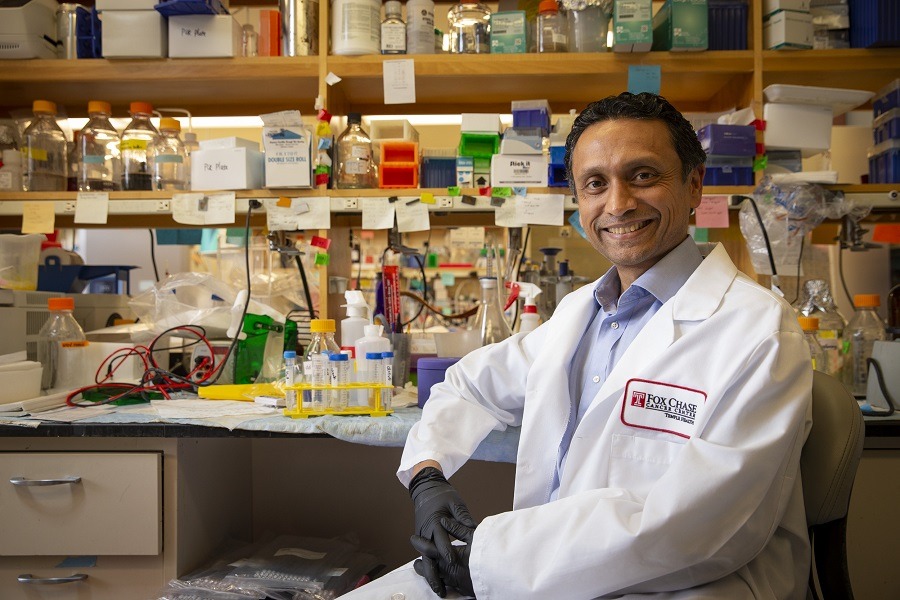Philly Researchers Have Found an Unlikely Cancer-Fighting Ally–From The Flu Virus

As the quest for cancer cures marches on, Philadelphia has been at the forefront. Local researchers have found ways to use AI, Radiodynamic therapy, adoptive cell therapy, and even the field of epigenetics to give cancer patients options and hope.
Now, in another groundbreaking study out of Philly, Fox Chase Cancer Center researchers are developing a much-needed therapy based on discoveries made studying a very common virus most of us have experienced first-hand: the influenza virus.
Siddharth Balachandran, PhD, a co-leader of the Blood Cell Development and Function research program at the Fox Chase Cancer Center, led the research behind the new therapy, which is targeted at patients whose cancer is unresponsive to standard immunotherapy.
While immunotherapy — which trains the body’s own immune system to target cancer cells — has been a game-changer for some patients, it’s ineffective in 70%-80% of patients. That’s typically because their cancers have adopted characteristics that trick the immune system into ignoring them as a threat. This is sometimes referred to as tumors turning “cold.”
Balachandran and his fellow researchers knew that finding a way to turn those “cold” tumors “hot” would re-enable the body’s own immune system to fight the tumor and rekindle responsiveness to immunotherapy.
“The main problem for patients who do not respond to immunotherapy is the immune system doesn’t see the tumor as dangerous enough,” Balachandran says. “We needed to find a way to make the tumor come off as dangerous, and we found that mimicking a flu infection within the tumor will bring the immune system running to that spot.”
Researchers were able to find a compound — called CBL0137 — which mimics the flu virus and triggers a potent immune response to any cell exposed to this compound. Injecting this compound directly into a cancerous “cold” tumor mimicked a virus infection with the tumor, alerting the immune system to the presence of the tumor.
Clinicians at Fox Chase will begin recruiting for a phase 1 clinical trial in the very near future which the compound will be used alongside immunotherapy drugs for melanoma patients.
“It’s like painting a target,” Balachandran says. “The body knows exactly what to do with dangerous cells once it knows where they are.”
Balachandran has a theory as to why so much important cancer research is coming out of Philadelphia, and his hospital in particular: the gift of time and freedom to explore.
“The only resource we need, other than the money to do our science, is breathing space,” he says. “More and more, funders and hospitals want scientists to take the shotgun approach of finding new cancer therapeutics. But it doesn’t work like that. Many of the major discoveries that have produced important therapies have come from serendipitous findings by individual laboratories, typically when studying something else. Science doesn’t work in this linear way that people think it does — It’s a lot more zigzaggy.”
That’s exactly what happened with the new trial. Research from a totally different area — influenza — revealed new information about cellular immune responses that scientists were then able to apply to cancer therapy. Balachandran says that wouldn’t have been possible to do everywhere.
“Fox Chase trusts in our ability as scientists to make discoveries,” he says. “They allow us to do any research we want. If they restricted us to only study areas considered ‘cancer relevant,’ this discovery wouldn’t have ever happened.”
It’s crucial that it did. Cancer treatment is all about giving patients options to turn to when one therapy does not work. This new trial has the potential to provide a life-saving option for cancer patients who aren’t responding to standard chemotherapy or immunotherapy.
“It’s a huge unmet medical need,” Balachandran says.
This is a paid partnership between Fox Chase Cancer Center and Philadelphia Magazine
